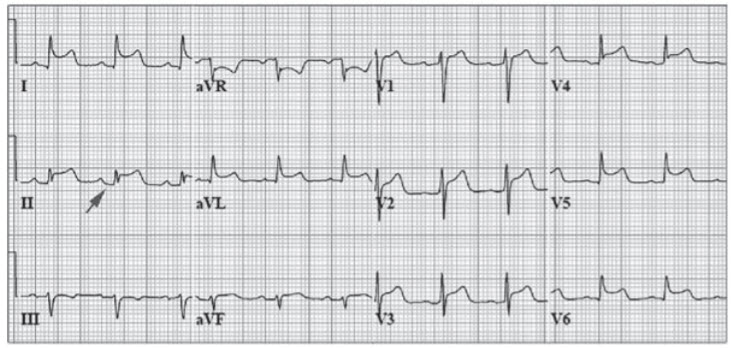Question 56#
A 32-year-old woman presents to the hospital with chest pain. She states that the pain is sharp, worse with deep inspiration, and is somewhat relieved by leaning forward. She is febrile and a friction rub is heard on examination. An ECG is shown below.

The patient is offered treatment but refuses all medications. Which of the following is the most common complication if this disease remains untreated?
A. Cardiac tamponadeB. Recurrent pericarditis
C. Constrictive pericarditis
D. Ventricular free wall rupture
E. Valvular insufficiency
Correct Answer is B
Comment:
Recurrent pericarditis. The chest pain and ECG are typical of acute pericarditis, which commonly presents with fever, pleuritic chest pain, new onset pericardial effusion, and diffuse concave ST elevations on ECG. Most cases have an infectious etiology, including Coxsackie viruses, HIV, influenza, S. aureus, S. pneumoniae, tuberculosis, and various fungi. Other important causes include cancer, autoimmune diseases, post-MI or cardiac surgery, radiation therapy, and uremia. All patients should be treated with NSAIDs and colchicine to improve symptoms and prevent complications. Patients who are not treated are much more likely to develop recurrent pericarditis, which is defined as a recurrence of symptoms after the inciting event (e.g., virus) has passed. (A) Pericardial effusions commonly accompany acute pericarditis; however, cardiac tamponade is a rare complication. (C) Constrictive pericarditis is a possible outcome of any cause of acute pericarditis; however, it is not the most common complication. (D) Free wall rupture is a complication of acute myocardial infarction. (E) Pericarditis affects the pericardium although the myocardium is sometimes affected as well. However, the rate of valve involvement and complications is low.